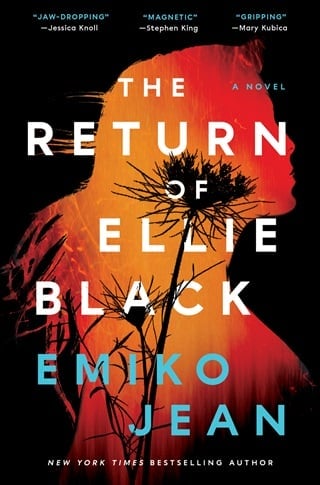Chapter Twenty-Two
IT IS CLOSE TO MIDNIGHTand Chelsey is in her father's office. She has cleared the walls of the animal heads, pictures, and plaques. And in their place, a giant map of Washington with little pins, sticky notes, and photographs. Thirteen pictures in total. All courtesy of Gemma Kincaid at the statewide Cold Case Unit. All unsolved missing persons. All girls ages fourteen to seventeen. All poor. White. Out of the thirteen, four bodies have been found, Gabby Barlowe included—all of them strangled and dumped in various state parks. One of the thirteen, Hannah Johnson, a foster kid, was last seen near a blue station wagon. Just like Gabby. Like Ellie. Two is a coincidence. Three is a pattern.
Chelsey turns to Willa. Still an anomaly. She does not fit. She has pinned her photograph to the side, away from the other girls. Why did he take her? What changed? Something happened. Gabby was the last body found. And Ellie magically reappeared. Chelsey thinks about Ellie's neck, the clean white flesh. Her nails filed neatly, unbroken. No signs of abrasions on her hands or knees, as if she'd jumped from a vehicle. Maybe she did not escape. Maybe she was not left for dead. What does that mean? It means something is off with Ellie. It means Ellie is not saying something.
Chelsey rubs her eyes and peers at the wall again. Is this crazy? To think that all these girls are somehow related? That Chelsey, this small-town cop, has stumbled into a case this large, a killer this prolific? That Ellie is somehow the key to it all?
If only these girls could talk. What would they say? What terrors would they whisper of? The half dozen Clif Bars Chelsey has eaten sit like tiny rocks in her stomach. At her shoulder, she feels the cold silhouette of Lydia. Her sister is suddenly all too present. Her laughter. Her scent. Her words: Pinkie swear. Then there are more shadows at Chelsey's back. A frenzy of missing girls. They do not give answers. They do not speak of what has come to pass. They whisper: Find us. Please. The words becoming a chant, a command. She tilts her head at the map, and silently says, I will. Promise. Cross my heart and hope to die. As if it is so easy. These childhood vows. Made when girls are young. When they slept under beds with fairy lights, ran through streets after dark, rode their bikes, and it was not dangerous to go far from home.
She scoops up her phone and dials.
The phone rings. "Detective Calhoun, it's after midnight," Kat answers.
"Sorry about the late call," Chelsey says, although she is not sorry. She feels like she's racing against a clock ticking twice as fast. "But I need you to bring Ellie to the station first thing tomorrow morning," she says, voice authoritative. She stares at Willa's photo. Chelsey is firm in her decision. Ellie isn't the only one to consider anymore. Hasn't been the only one since Gabby Barlowe. But then, Chelsey had felt time was on her side, Gabby long buried. Now, Willa could still be alive out there. Now, Ellie is stonewalling her, lying to her. Now, they are opponents. Staring down at each other from ends of a field.
"What? Why?" Kat is annoyed, slightly alarmed.
Chelsey feels as if she's about to wage a war with no winners. But what choice does she have? She will do what she must to find Willa. Even treat Ellie as a hostile witness. "I have some…" She pauses, lets the words bend on her tongue. "… wrap-up questions to close out the case."
"She has to come to the station for that?" Kat asks.
A ringing starts in Chelsey's ears. An alarm bell warning. "Yep, it's a formal process. Some of the paperwork has to be notarized." Here is Chelsey, feet perched on the edge of a very slippery slope. How far will she go? She does not admit it to herself, but she will do anything… anything to save a life. If only. If only. If only. It startles her a bit, realizing the depths she may go to catch this guy.
"Oh, okay. Sure," says Kat. "I'll bring her in tomorrow."
"Great," Chelsey says. They arrange a time, eight a.m., right when the station opens.
Chelsey leaves her father's office. In the hallway, she pushes the door to Lydia's room open. It smells the same. Baby powder and sunflower perfume. Like Lydia. Chelsey flicks on the light and sits on the bed on the white eyelet comforter. Above the door are seven bold bubbled letters, each filling a single page. Together they spell the word freedom. Lydia had made the sign herself. Chelsey had watched as her sister drew the outline of the letters, the smell of Sharpie light in the air—then filled each in with dots, stripes, or little daisies.
She wonders what Lydia might have become if Oscar hadn't killed her. She would have traveled, Chelsey is sure. Left home and attended music festivals, maybe Burning Man. But she'd always come back, road-worn and weary and thankful for their bulldog father, their fussy mother, her clingy sister. She would sit at the Lucite table with Chelsey and regale her with tales from afar while their mom, who is still married to their father, made dinner—chicken tetrazzini. Lydia has had pecan pie in Alabama, barbecue from Kansas City, crawfish in Louisiana, but her mother's cooking is still the best thing she has ever tasted.
A lump rises in Chelsey's throat, and she gulps it back. She won't allow the tears to come. All these girls. These bright, bold, beautiful girls. All that potential wasted. All those possibilities snuffed out. What could have been. The question stretches to infinity. She pulls one of Lydia's Beatrix Potter rabbits from the bed and screams into it with a shimmering, impotent rage.
 Fullepub
Fullepub 



